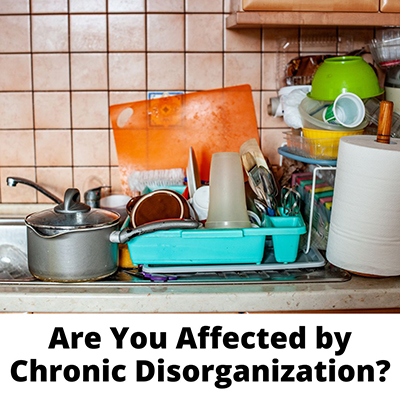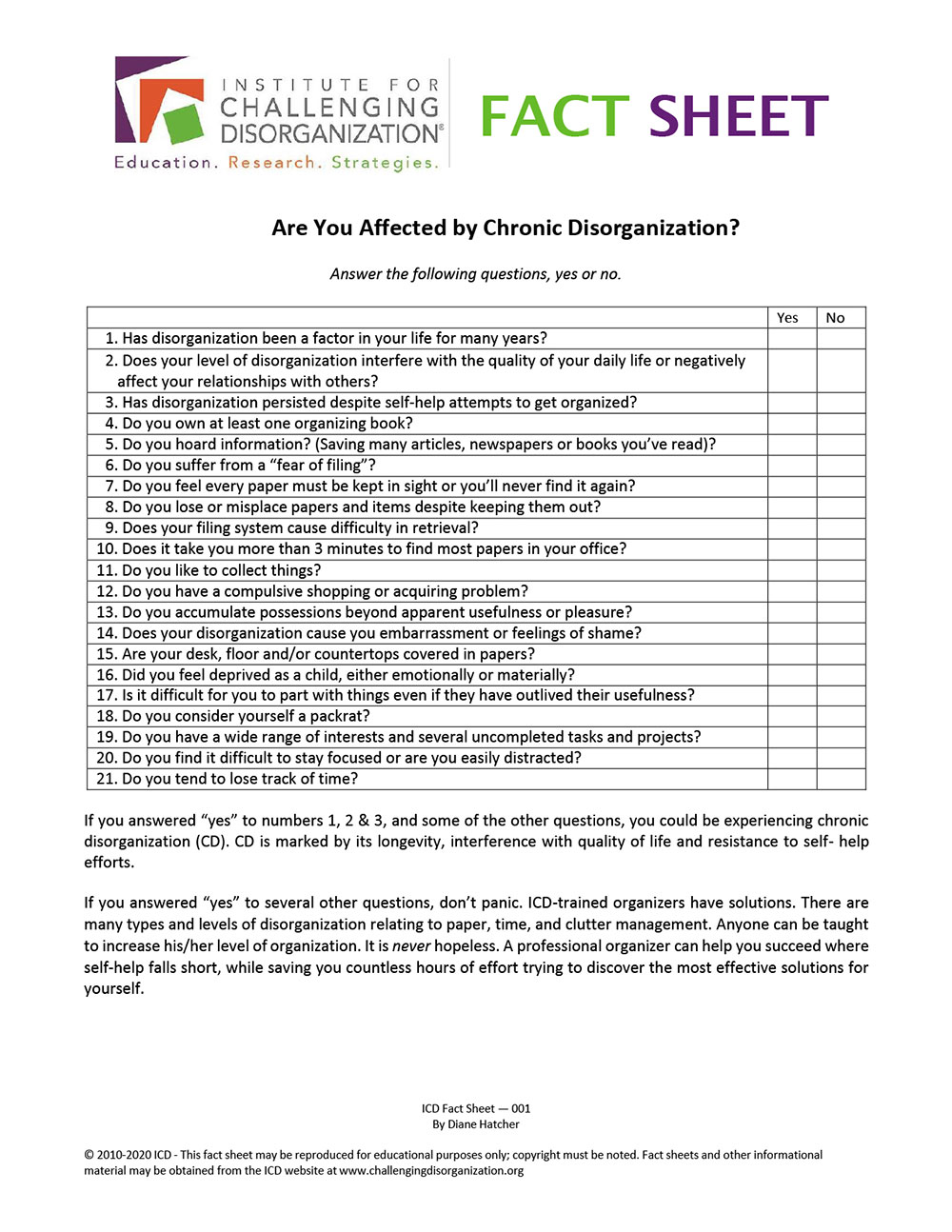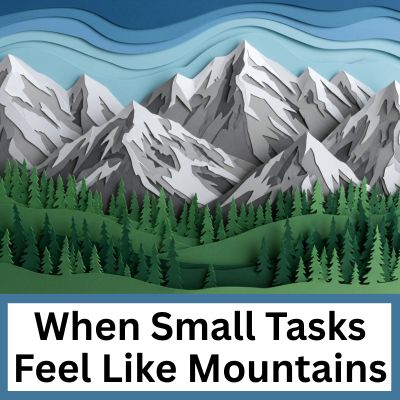Are You Affected by Chronic Disorganization?

About half of my clients come to me because they want help for specific projects, like unpacking after a move, reorganizing a kitchen, overhauling a home office, making a garage more functional, or doing a closet refresh. The other half are affected by chronic disorganization. What is Chronic Disorganization (CD)? To meet the criteria for CD, first, the disorganization must have been a factor in your life for many years. Second, the disorganization must interfere with your quality of life or negatively affects your relationships with others. The third qualifying criteria is that the disorganization persists despite self-help attempts. If you think you or someone you love is affected by Chronic Disorganization, keep reading to see if the rest of this post rings true.
- CD persists over time. Think back to when you were young. Were you organized then? How about in high school? College? Have you always had trouble knowing where your things are?
- People with CD accumulate things beyond necessity or pleasure. Do you wish you didn’t have so much stuff, but you don’t know what to do about it? You may have trouble prioritizing the items in your house that are important and useful from those that you’ll never need and are extraneous.
- They have difficulty letting things go. Do you have trouble parting with worn items of clothing (well beyond repair), old food in the fridge, or even taking the trash out? There are many different reasons why it’s hard to let things go. It may be because you’re affected by CD, but it could be something else too.
- They have a wide range of interests. Lots of people have a wide range of interests, including myself! Some people like to deep dive and become an expert on something, and others like to dabble. The problem with having a wide range of interests is that you often will need the books, supplies, equipment, and time for each of your interests. All that stuff takes up a lot of space in your life. But when you take this point in context (you have a wide range of interests plus many of the other statements are true for you), you may be affected by CD.
- They have numerous uncompleted projects. Don’t we all?! Some people have an easy time completing a project before they move on to the next, many people let life (and many other valid excuses) get in the way of completing projects. Uncompleted projects create lots of physical and mental clutter. As rewarding as it is to finish a project, sometimes the best decision is to just scrap the idea and move on!
- They need visual cues to remember to do things or to remember where things are. Are you afraid of putting things away where you can’t see them? It’s totally normal to leave a post-it note on the door to remember to grab your lunch before you go to work, but when your door is COVERED in post-it notes, there’s no way the message can get across with all that visual noise.
- People with CD are easily distracted. Covid has definitely challenged EVERYONE on their ability to focus. Whether you’re brain is distracted by worrying about raising case numbers, sick loved ones, or the virus has left your brain in a fog, please know that you’re not the only one who’s getting distracted these days! But if you’ve been easily distracted your whole life, this may be a sign that you’re affected by CD.
- People with CD have time management challenges. While the concept of time is just an illusion, it’s still important to be able to have a concept of time so that you can plan projects so that you’re not rushed and overtax your nervous system. Understanding a sense of time will also help build credibility and trust with yourself, because you won’t overcommit and then have to flake at the last minute. It’s also important so that you can be respectful to your friends and other people who you make time based commitments to (like being ready for your organizing appointments). Time blindness is very common amongst the CD/ ADHD crowd. Tuning into your internal biorhythms is important too, but that can also be hard for people with CD.
- They struggle to set up and/or maintain systems and have tried self-help methods without success. How many organizing books do you have on your bookshelf right now? Have you tried to take self-guided online classes? Do you keep thinking that you should be able to do it on your own, but nothing you do is making a difference?
- Their disorganization or clutter negatively impacts functioning and/or quality of life. Is your clutter so debilitating that you feel like it’s holding you back from what you want to do in life? Do you want to move to a new house but you have so much stuff in your home that weighs you down and prevents you from making a change? Or maybe you’re in constant marital strife because your house is so full of stuff. You may also have financial issues because you keep buying things you know you already own but you can’t find. You might be having trouble in school or at your job because you just can’t seem to keep your things together.
- Some people with CD are highly self-critical or blame others. Are you really hard on yourself? Or are you not hard enough on yourself? People who are really hard on themselves usually will never say that they are hard on themselves, they will only say that they’re not hard enough on themselves. Or are you constantly deflecting blame onto your spouse, your parents, your kids, or anyone else, without taking responsibility for your own mess?
- The causes for CD range widely. Neurologically based conditions such as ADHD, traumatic brain injury, fibromyalgia, Parkinson’s, and multiple sclerosis may be why you can’t get organized. Mental health issues such as depression, compulsive hoarding, anxiety, and avoidance disorder may be at fault. Addictive tendencies such as compulsive acquisition, compulsive saving, drug/alcohol, addiction may be why. There could be environmental factors, a lack of skills, you could be in transition, or maybe you’re just over-scheduled. There are many factors that are associated with disorganization.
Check out the Institute for Challenging Disorganization Fact Sheet 001 (image below) created by Diane Hatcher, to determine if you may be experiencing challenges with Chronic Disorganization. Chronic Disorganization is unlikely to change without outside intervention, however anyone can be taught to increase his/her level of organization. You’re not hopeless! Work with me, or another professional organizer who is experienced and trained to help someone with Chronic Disorganization. It will save you tons of time and stress to help you find the most efficient solutions for you.


By Jean Prominski, Certified Professional Organizer
Don’t forget to sign up for my organizing classes here
Download my free 5 week journal The Seattle Sparkle Method to Get Organized and Stay Organized
Sign up for my free 4 Day Color to Declutter Challenge.
Become part of a like-minded community by joining my Facebook Group, Declutter and Organize with Seattle Sparkle.
Ready to book a consultation? Complete this form.
For artwork to energize your home, order through jeanprominski.com or on Etsy.




